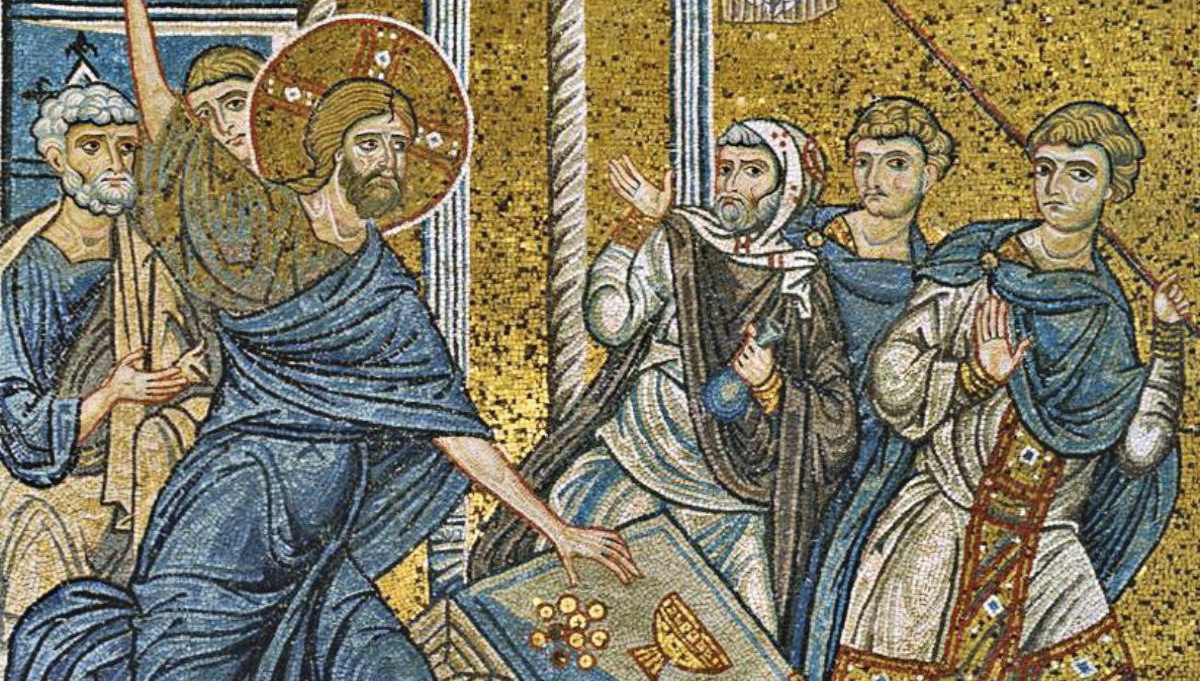Matthew 21:12-22 is a passage I’m very familiar with in my reading… and know so little about in context of the story. For too long I have looked at each part without regard to the whole.
I had read the part of Jesus entering the Temple and tossing the tables and declaring the place had become a den of robbers. It was to be a “house of prayer” so I would develop sermons on prayer and how to pray, etc.
Then, there is the scene the next morning of Jesus cursing the fig tree and prayer and faith… and so along came another sermon or two about prayer and faith and being bold, etc.
Thank you, N.T. Wright, for tossing my world upside down and helping me see not only the connections in this passage, but how this passage is a fulcrum for the entire Gospel of Matthew!
For one, the phrase “den of robbers” isn’t translated well. I’ve also seen “hideout for crooks” (Common English Bible). Wright uses the English phrase “brigands’ lair”. Here is what the passage can then turn up for us:
When he says, ‘You’ve made it a brigands’ lair’, the word brigand doesn’t mean a thief. ‘Brigands’ were revolutionaries, people who believed so strongly in God’s coming kingdom of justice and triumph for Israel they were prepared to take the law into their own hands. They were the violent ones Jesus had commented on earlier in the gospel (11:12). The Temple itself, instead of being regarded as the place where Israel could come to God in prayer, had come to stand for the violent longings of the ‘brigands’ for a great revolution in which the kingdom of God would come by force. It was everything Jesus had opposed throughout his lifetime, not least in the Sermon on the Mount. Now his warnings against ‘the house’ were to come true. — Wright, T. (2004). Matthew for Everyone, Part 2: Chapters 16-28 (p. 72). London: Society for Promoting Christian Knowledge.
Jesus is trying to get Jerusalem to pause. It isn’t a violent rebellion that will bring them freedom. It is the way of the Kingdom of God that will bring freedom again.
In v. 14 there is the healing of the blind and the lame. Wright takes this back to 2 Sam. 5:6-10 to show that since the time David took the city the blind and the lame hadn’t been allowed in the Temple area because David had not wanted the reminder of the enemy’s taunts when he took the city. (Again, my mind is going through a huge adjustment on this passage!)
But then there is the next day (v. 18) and the cursing of the fig tree. Again, it’s all tied together and has everything to do with the Temple and Israel’s rebellion and what the Kingdom was going to do: toss the system.
Saying to ‘this mountain’ that it should be ‘lifted up and thrown into the sea’, when you are standing right beside the Temple mountain, was bound to be taken as another coded warning about what would happen to the Temple as God’s judgment fell upon his rebellious people. — Wright, T. (2004). Matthew for Everyone, Part 2: Chapters 16-28 (pp. 72–73). London: Society for Promoting Christian Knowledge.
Putting all that together, the Gospel of Matthew then explodes in power and conflict. The next few chapters will be the tension that is unbearable as the religious leaders understand what Jesus is really intending to do and they are doing all they can to stop it.
Wright doesn’t stop there. He brings in an application that has my mind grinding its gears now:
But for the moment we should ponder not only Jesus’ extraordinary and unique action, but the ways in which a similar revolution may sometimes be necessary in today’s world. Which institutions in your country have become corrupt, so that they now serve the opposite purpose from that for which they were set up? Where do you see systems which were supposed to enable people to worship and pray, but which have now turned themselves in the opposite direction to the message of Jesus? What can you do about it?
The Kingdom of God has come to set things right. Are we allowing that Divine disruption to take place?


THIS: The Kingdom of God has come to set things right. Are we allowing that Divine disruption to take place?
Very well said!
Reblogged this on Talmidimblogging.